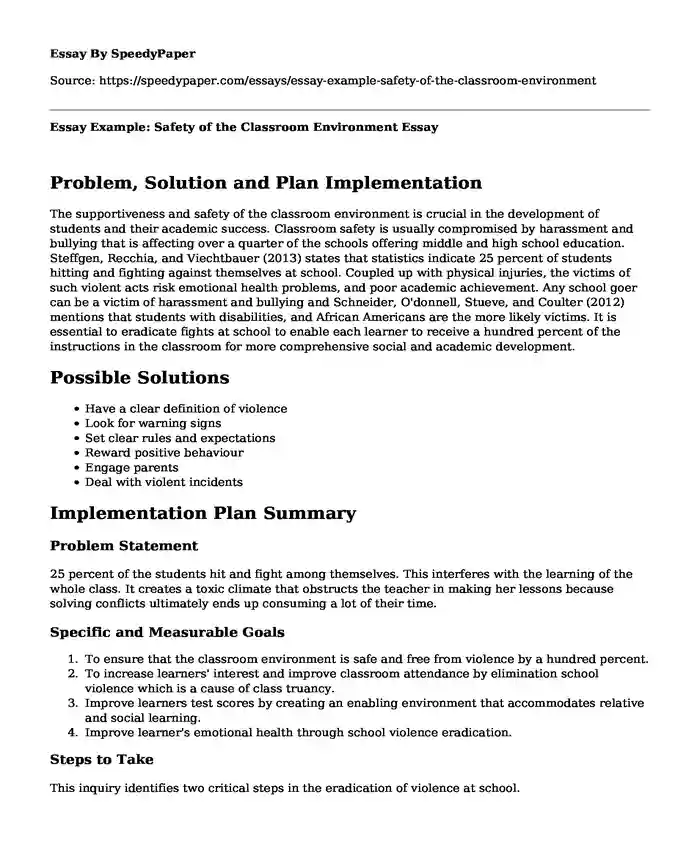Problem, Solution and Plan Implementation
The supportiveness and safety of the classroom environment is crucial in the development of students and their academic success. Classroom safety is usually compromised by harassment and bullying that is affecting over a quarter of the schools offering middle and high school education. Steffgen, Recchia, and Viechtbauer (2013) states that statistics indicate 25 percent of students hitting and fighting against themselves at school. Coupled up with physical injuries, the victims of such violent acts risk emotional health problems, and poor academic achievement. Any school goer can be a victim of harassment and bullying and Schneider, O'donnell, Stueve, and Coulter (2012) mentions that students with disabilities, and African Americans are the more likely victims. It is essential to eradicate fights at school to enable each learner to receive a hundred percent of the instructions in the classroom for more comprehensive social and academic development.
Possible Solutions
- Have a clear definition of violence
- Look for warning signs
- Set clear rules and expectations
- Reward positive behaviour
- Engage parents
- Deal with violent incidents
Implementation Plan Summary
Problem Statement
25 percent of the students hit and fight among themselves. This interferes with the learning of the whole class. It creates a toxic climate that obstructs the teacher in making her lessons because solving conflicts ultimately ends up consuming a lot of their time.
Specific and Measurable Goals
- To ensure that the classroom environment is safe and free from violence by a hundred percent.
- To increase learners' interest and improve classroom attendance by elimination school violence which is a cause of class truancy.
- Improve learners test scores by creating an enabling environment that accommodates relative and social learning.
- Improve learner's emotional health through school violence eradication.
Steps to Take
This inquiry identifies two critical steps in the eradication of violence at school.
The first step in controlling violence at school is knowing the risk factors that can lead to a violent situation. According to Carrell and Hoekstra (2011) predicting trouble can stop disputes before they happen. This means that students have to be watched all day long attempting to detect the behavioral changes and the indicators for tension. For instance, lunchtime conversations growing louder or a student hurdling in a specific corner can signal of violent abuse. In detecting these signals, educators ought to be careful and avoid indiscriminate profiling. A child might fit descriptions of violent person though never violent in any way.
The other step in violence eradication is a crisis response that as part of the teachers training requires educators to create a positive environment. Melhuish, et al. (2008) identifies a peaceful school environment to be a tool to calm defiant students naturally. While this cannot work for all learners, some approvable methods are applicable. Educators can remove agitated learners from class and direct their attention to other activities. Teachers can approach defiant students without invading their privacy or trying to instill authority on them. Use of non-verbal cues can be helpful as well. This can help control violence at school.
Expected Outcomes
If the proposed steps are initiated in the reduction of violence in school, this inquiry identifies several positive outcomes.
Provided that lack of safe environment in school is the number one cause of truancy, it is expected that this will reduce and improve class attendance.
The psychological health issues relating to violence at school can equally reduce with the safe environment.
Ultimately, the inquiry identifies improved classroom and test performance as a result of the enabling environment.
Connection to NAEYC standards
This inquiry identifies some connection to the NAEYC standards as follows.
Igniting the learner's interest by creating a safe and engaging learning environment.
Encouraging learner's growth through by increasing their school attendance.
References
Carrell, S. E., & Hoekstra, M. L. (2011). Externalities in the classroom: How children exposed to domestic violence affect everyone's kids. American Economic Journa. Applied Economics, 2(1), 211-28.
Melhuish, E. C., Phan, M. B., Sylva, K., Sammons, P., SirajBlatchford, I., & Taggart, B. (2008). Effects of the home learning environment and preschool center experience upon literacy and numeracy development in early primary school. Journal of Social Is, 95-114.
Schneider, S. K., O'donnell, L., Stueve, A., & Coulter, R. W. (2012). Cyberbullying, school bullying, and psychological distress: A regional census of high school students. American journal of public health, 102(1), 171-177.
Steffgen, G., Recchia, S., & Viechtbauer, W. (2013). The link between school climate and violence in school: A meta-analytic review. Aggression and violent behavior, 18(2), 300-309.
Cite this page
Essay Example: Safety of the Classroom Environment. (2022, Sep 19). Retrieved from https://speedypaper.net/essays/essay-example-safety-of-the-classroom-environment
Request Removal
If you are the original author of this essay and no longer wish to have it published on the SpeedyPaper website, please click below to request its removal:
- Contrast Essay Sample: Friday Movie 1995 and Short Story Moonlight by Maupassant
- In Pursuit of Knowledge, Essay Example
- Free Essay on the Impact of White Male Privilege on Identity Formation of Mexican Women
- Free Essay Sample on International Law
- Free Essay: God Problem in Nietzsche, African Land Grab, The Suffrage Movement
- Essay Sample Dedicated to Ambient Intelligence and Interior Design for Kids
- Why Lack of Literacy Is a Problem - Cause and Effect Essay
Popular categories





